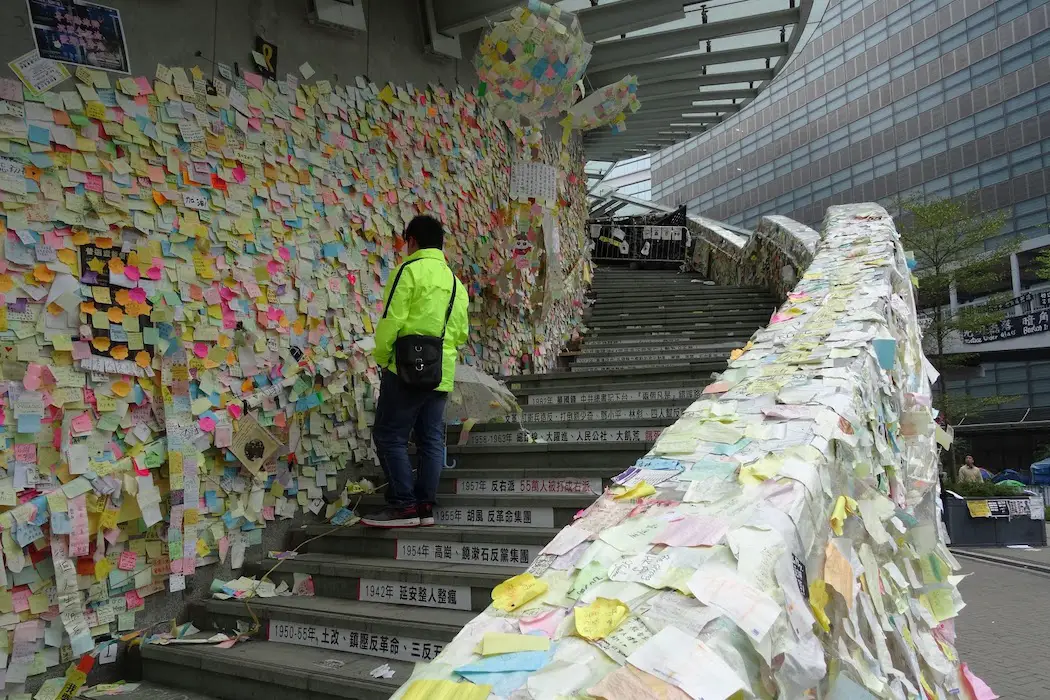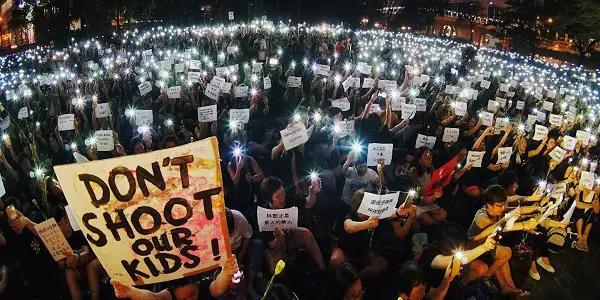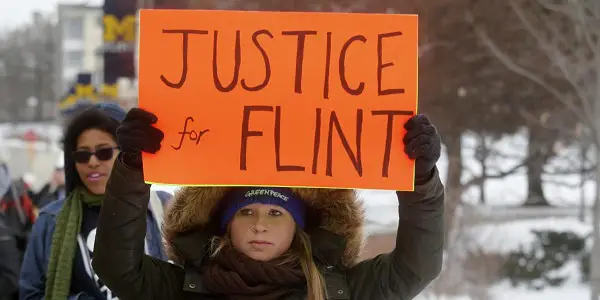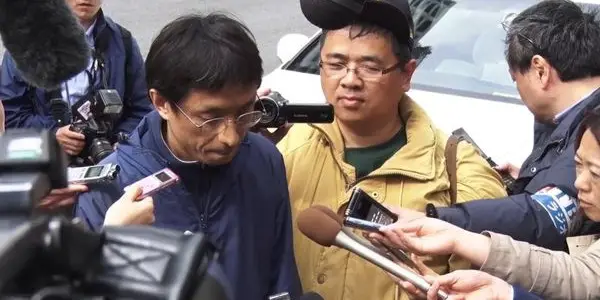Sheffield Doc/Fest Part 1: WE HAVE BOOTS, FLINT, ME AND THE CULT LEADER

Musanna Ahmed is a freelance film critic writing for Film…
Uncertain times call for creative solutions and, like many film festivals, Sheffield Doc/Fest would rather compromise than sacrifice, offering film-goers an alternate way to see incredible new documentaries after confirming a physical edition would not go ahead due to the current pandemic. Over the past month, the festival launched an online platform called Selects, on which UK audiences were able to digitally see new documentaries via a great pay-per-view model. Furthermore, the festival won’t be discounting theatrical screenings altogether, intending to continue in Autumn with a series of weekend screenings in Sheffield.
Whilst I greatly missed the city, the people, and the Showroom Cinema, I was appreciative of Doc/Fest’s determination to go ahead in this new form. Over three columns, I will be reviewing the highlights of my viewing experience on Doc/Fest Selects. To begin with, here are my reviews of We Have Boots, Flint, and Me and the Cult Leader.
We Have Boots (Evans Chan)
Hong Kong Second Wave auteur Evans Chan brings an essayist touch to his new documentary film We Have Boots. Creatively constructed and highly informative, this is a cinematic anthem for Hong Kong’s Umbrella Movement.
The film opens by juxtaposing a nationalist Chinese passage of words – criticising HK’s education, the US’s history of colonialism and slavery, how the rise of China has “blazed a new trail for mankind – before cutting to the reality of the 2019-20 protests where we witness police brutality and misconduct attempting to suppress the thousands who took to the streets to protest against the Fugitive Offenders Amendment Bill, which would have potentially seen China exploit its power over dissident voices in neighbouring countries.

Before these recent protests, though, the Umbrella Movement happened in 2014, serving as a catalyst for the events of five years later. We Have Boots thoroughly recaps the revolution, collating the perspectives of activists, academics, and other intellectuals in Hong Kong who provide historical and cultural context. Former Hong Kong student union leader and current Berkeley student Alex Chow is a key talking head, speaking of his unique experience in jail wherein he learned of the reality for the underprivileged people in the region.
Likewise, social activist Agnes Chow has an interesting origin story, talking about how Scholarism – the leading organisation during the Umbrella Movement – was founded after she went viral for calling for transparency regarding the missing booksellers of Causeway Bay in late 2015. “People are powerless only wielding the meagre power of voting”, she says, succinctly endorsing the power of protest that many Hong Kongers have believed in over the last ten years of controversial government ruling.
As secure of a learning experience, it is to view talking heads and archive footage of demonstrations, it’s the cinematic flair that makes We Have Boots so enthralling. As aforementioned, the opening sequence is a brilliant example. There’s also a staggering drone shot over thousands of protestors that are augmented by picture-in-picture dissolves of the possible changemakers on both sides, including former legislator Margaret Ng and Hong Kong’s Chief Executive Carrie Lam.

We Have Boots is a great piece of journalism that could only have improved if there was access to the alternate perspective. All the academics and activists interviewed are on the side of the Umbrella Movement. However, when it’s clear that mainland China can control the narrative, thus resulting in such widespread protests, the inclusion of pro-government POV’s becomes less appealing.
Flint (Anthony Baxter)
Anthony Baxter’s Flint is one hell of an exposé. The You’ve Been Trumped director spends five years in Flint, Michigan to document the history and effects of the water crisis – anyone who followed the news will know how harrowing the story is but approaching the issue up-close is where Baxter’s film wields its power. Narrated by the platinum larynx of Alec Baldwin, Flint is a bona fide socio-political thriller, featuring big twists when facts go to war with pseudoscience.
We waste no time in getting to know Flint’s citizens from a personal standpoint to understand how they’ve been affected. First, we’re introduced to the Loren family, where mother Tammy Loren – not to be confused with Tomi Lahren, who’s more interested in spending $5b on a wall than water infrastructure upgrades – speaks on how her family doesn’t have a history of illnesses but her young son is seeing sickening developments on their bodies. The pre-teen has what looks like chickenpox all over his body except, unlike the chickenpox, it hasn’t gone away after 2 weeks – in fact, it’s been there for about a year.

We meet several more families and citizens of all backgrounds: lawyer Trachelle Young talks about the fear to bathe in the lead-laden tap water and elderly citizens are frightened when their water is tested and the results show their tap waters are corroded with some of the highest amounts of the lead in the city. Whilst we get to know dozens and dozens of individuals as Baxter and his team deeply embed themselves with the community, there’s also a slightly missed opportunity to follow up with the ones whose fates seem the most uncertain.
Nevertheless, there are enough testimonies to paint a vivid picture of what life was like during the crisis and the more pressing issue becomes how authorities dealt with it. For one, we understand how doctors misdiagnosed dozens of cases as a form of pneumonia, which reminds me of the early days of the current pandemic when no one really knew what Covid-19 was. Then there’s the nauseating footage of Obama’s visit, which was convincingly examined in Michael Moore’s Fahrenheit 11/9 as a very suspect publicity stunt to shun federal responsibility. Finally, and most significantly, Mark Ruffalo and Scott Smith of Water Defense make well-intentioned efforts to help, but their work is implicated to be dubious.

The level of personal access is astounding, making for incisive and insightful storytelling. Stunningly edited, Baxter squeezes out as much juice as he can, coherently telling this dramatic story from presumably hundreds of hours of footage over the half-decade period, necessarily so to determine the shocking effects and aftermath. Remember when viral tweets had to remind us that Flint still didn’t have clean water? It was the direct result of a media cycle moving on after the first year, so the director’s continuous approach is crucial. As one of the subjects, Mama Sol, says, “I feel worried for Flint cos we’re not in the news anymore. People saw footage of some pipes being replaced and think we’re alright now.” A vital movie for a volatile time.
Me and the Cult Leader (Atsushi Sakahara)
Me and the Cult Leader is an excellent documentary in that special league of films in which characters pursue or reject the opportunity for catharsis, such as The Work and The Act of Killing. In the best of these films, the journey for the complex subjects unravels at a meditative pace, and the odyssey in this particular film is unique and poignant.
The story between Atsushi Sakahara and Hiroshi Araki begins in 1995 when Sakahara was a victim of the sarin gas attack in Tokyo’s subway system. The coordinated chemical weapon attack was carried out by doomsday cult Aleph, back when they were known as Aum Shinrikyo, and Araki was – and still is – a part of this group, serving as their spokesman. Sakahara still feels the effect of the sarin gas these days – fatigue, paralysis, PTSD – and seeks to face the present-day incarnation of the cult for an earnest conversation about the past. This documentary is born after a year of negotiation with his new friend Araki, who agrees to be recorded for a sober introspective of his life.

Sakahara and Araki’s epic conversation spans a few key locations, from the long bullet train to their hometown to their university campus, as the documentary geographically contextualises their lives to the rawest extent. Every single discussion between Sakahara and Araki is rich with subtext as they trawl through their memories, especially of the family – Araki speaks on the process of renunciation from his folks when he left for the cult and Sakahara reveals how he didn’t realise his ex-wife was a former member of the cult until shortly before their marriage. The best films have to say something about the human condition and here is a film that strongly explores time, trauma, redemption, and the difficulty in disconnecting from a cause you believe in.
Part of Sakahara’s genius in making this film is in the spare, minimalist way he chooses to shoot and edit. Much of the shoot lingers on Araki’s weathered expression as he struggles to step outside his comfort zone and talk about the past, his inarticulateness, and long pauses speaking for him as Sakahara refuses to press pause or cutaway. It’s so emotionally overwhelming for the two to have a blunt conversation about the cult’s practises and ideologies, and how it’s impacted them both in different ways, and Sakahara understands there’s no need for a score, rejecting the potential of music to augment (or just manipulate) our senses.

You put yourself in the position of Sakahara and yourself, would I have the same capacity to try and empathise and understand Araki’s position? This endlessly intriguing film provokes a lot of thoughts by deeply investing you into the histories of two distinct individuals who were affected by the act of domestic terrorism over twenty years ago.
Part 2 of my coverage of Sheffield Doc/Fest will include reviews of Shut Up Sona and The Go-Go’s, two musical biopics that may be entirely different in form but share similarities in how successful they are in depicting the stories of groundbreaking women artists. Stay tuned for my reviews and see below for the trailer of Me and the Cult Leader.
Does content like this matter to you?
Become a Member and support film journalism. Unlock access to all of Film Inquiry`s great articles. Join a community of like-minded readers who are passionate about cinema - get access to our private members Network, give back to independent filmmakers, and more.
Musanna Ahmed is a freelance film critic writing for Film Inquiry, The Movie Waffler and The Upcoming. His taste in film knows no boundaries.













